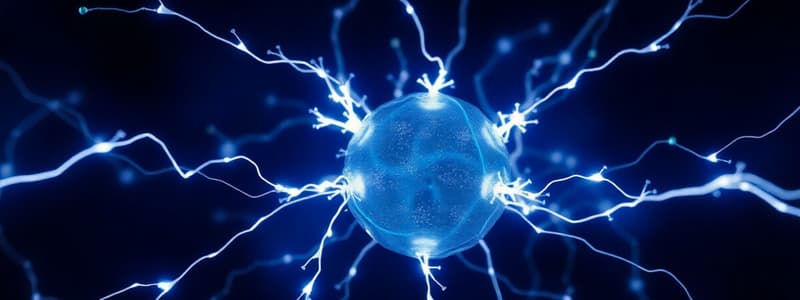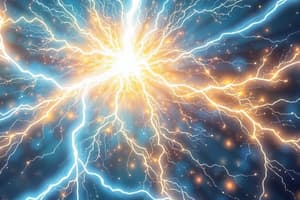Podcast
Questions and Answers
What is the primary characteristic of a series circuit?
What is the primary characteristic of a series circuit?
- It can operate even if one pathway is interrupted.
- It functions only when all components are connected. (correct)
- It divides the current among different paths.
- It allows multiple pathways for current flow.
Which formula correctly relates voltage, current, and resistance?
Which formula correctly relates voltage, current, and resistance?
- V = P/I (correct)
- P = IV
- R = P/V
- V = I^2R
How is electrical power defined in terms of energy and time?
How is electrical power defined in terms of energy and time?
- P = E + T
- P = E × T
- P = T/E
- P = E/T (correct)
What unit is used to measure electrical current?
What unit is used to measure electrical current?
Which of the following expresses efficiency in terms of energy output and input?
Which of the following expresses efficiency in terms of energy output and input?
What causes static electricity to form?
What causes static electricity to form?
What happens during electrical discharge?
What happens during electrical discharge?
Which law of electric charge states that like charges repel each other?
Which law of electric charge states that like charges repel each other?
What occurs when a charged object is brought near a neutral object?
What occurs when a charged object is brought near a neutral object?
Which of the following is true about a positively charged object?
Which of the following is true about a positively charged object?
How is lightning formed in clouds?
How is lightning formed in clouds?
What characterizes a complete circuit?
What characterizes a complete circuit?
What is static electricity primarily created by?
What is static electricity primarily created by?
Flashcards
Atoms
Atoms
Tiny particles that make up all matter and contain charged particles (electrons, protons, and neutrons).
Static Electricity
Static Electricity
Electrical energy created by a buildup of stationary electric charges, often on the surface of insulators.
Electrical Discharge
Electrical Discharge
The sudden flow of electric charges between two objects with a potential difference.
Opposite Charges
Opposite Charges
Signup and view all the flashcards
Like Charges
Like Charges
Signup and view all the flashcards
Electrical Circuit
Electrical Circuit
Signup and view all the flashcards
Complete Circuit
Complete Circuit
Signup and view all the flashcards
Incomplete Circuit
Incomplete Circuit
Signup and view all the flashcards
Electrical Current
Electrical Current
Signup and view all the flashcards
Ohm's Law
Ohm's Law
Signup and view all the flashcards
Electrical Power
Electrical Power
Signup and view all the flashcards
Series Circuit
Series Circuit
Signup and view all the flashcards
Parallel Circuit
Parallel Circuit
Signup and view all the flashcards
Study Notes
Electricity
- All matter is composed of tiny particles called atoms.
- Atoms contain charged particles: neutrons, protons, and electrons.
- Protons are positively charged.
- Electrons are negatively charged.
- Neutrons have no charge.
- Electrons are negatively charged and orbit the positively charged nucleus (containing protons).
- Static electricity is the buildup of stationary electric charges.
- Static electricity often occurs on the surface of insulators.
- Friction can cause static electricity. One material loses electrons and becomes positive, while the other gains electrons and becomes negative.
- Neutral objects have equal numbers of protons and electrons.
- Negatively charged objects have more electrons than protons.
- Positively charged objects have fewer electrons than protons.
- Charged objects can cause charge separation in neutral objects when brought close to them.
- Electrical discharge occurs when built-up charges on one object transfer to another.
- This creates a shock, often visible as a spark.
- Electrons typically "jump" to the positively charged surface.
Laws of Electric Charge
- Opposite charges attract.
- Like charges repel.
- Charged objects discharge to neutral objects.
Charging by Induction
- When a charged object is brought near a neutral object, it causes charge separation in the neutral object.
- This creates an attraction between the opposite charges.
Lightning
-
Lightning occurs when warm air rises above cool air.
-
The warm air condenses and releases energy.
-
Electrons transfer to raindrops, creating charges in clouds.
-
Bottom of clouds have a negative charge.
-
Top of clouds have a positive charge.
-
Positive charge is attracted to negative charge.
-
Lightning strikes are the discharge of electrons from a cloud to a positively charged surface (e.g., the ground).
Circuits
- A circuit is a complete path allowing electric current to flow.
- Circuits often include switches, complete circuits, incomplete circuits, and cells.
- A complete circuit has an unbroken path for current flow.
- An incomplete circuit has an interruption.
- A cell is a single unit that produces electric current.
- The steady flow of charged particles is called electric current.
Ohm's Law and Electrical Power
-
Ohm's law relates voltage, current, and resistance in a conductor. (V=IR)
-
Electrical power is the rate at which electrical energy is converted into another form like motion, heat, or light.
-
Formula: P=IV
Efficiency
- Efficiency measures the useful energy output relative to the total energy input. (Efficiency = Energy Output / Energy Input×100%)
- Formula: Efficiency = Useful Energy output/ Total Energy input x 100%
Series Circuits
- There's only one pathway for the current in a series circuit.
- If one part of a series circuit is interrupted the whole circuit stops functioning.
Parallel Circuits
- Parallel circuits have separate current paths for each section.
Circuit Components (Symbols and Descriptions)
- Symbols used to illustrate components in a circuit diagram are shown.
- Descriptions of those components are included in the notes.
Studying That Suits You
Use AI to generate personalized quizzes and flashcards to suit your learning preferences.




